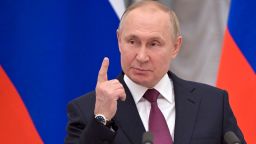The Senate late Thursday approved a symbolic resolution condemning Russia after failing to move a binding package of sanctions, showing the divisions that remain over Washington’s response to the Russia-Ukraine crisis even as members from both parties try to present a unified front.?
The resolution, which almost didn’t make it to the Senate floor before a week-long recess after Sen. Rand Paul, a Republican from Kentucky, objected to it, condemns Russia for its aggressive actions towards Ukraine.
Paul objected because the original draft of the resolution didn’t include clear language ensuring nothing in the resolution could be construed as an authorization of force or an authorization to use troops, he told CNN.
Sen. Jeanne Shaheen, who spearheaded the resolution with Republican Sen. Rob Portman, said the disagreements from both Republicans and Democrats had been resolved Thursday evening before the last series of Senate votes ahead of the recess, which allowed the resolution to pass by voice vote before the Senate gaveled out for the week.
While the resolution is a bipartisan declaration against Russia’s actions towards Ukraine, the step is a far cry from where Republicans and Democrats started weeks ago with talks of a bipartisan Russia sanctions bill. The sanctions bill, many senators believed, would have sent a strong and tangible message to Russian President Vladimir Putin that his actions towards Ukraine would have real, economic consequences.?
But the sanctions bill stalled after Republicans and Democrats could not agree on several key points including whether to impose sanctions before a Russian invasion of Ukraine and how to handle the controversial Nord Stream 2 pipeline.
Sen. Jim Risch, Ranking Member of the Senate Foreign Relations Committee, killed the last shreds of hope left for a bipartisan agreement on sanctions earlier in the week when he introduced his Republican-only Russia sanctions bill, the Never Yielding Europe’s Territory (NYET) Act.
Earlier Thursday: President Biden warned that he believed an attack would happen “within the next several days.”
Secretary of State Antony Blinken made a stop at the UN Security Council before heading to Munich to warn them that Russia was laying the groundwork to justify starting a war and preparing to launch an attack on Ukraine in the coming days.
The Democratic Majority Whip Dick Durbin said Thursday that there have been no discussions of bringing the Senate back from their scheduled recess if Russia invades Ukraine.
“Nobody’s talked about that,” said Durbin, when asked if there’s any indication if Russia does choose to invade whether they’d bring the Senate back into session.

























